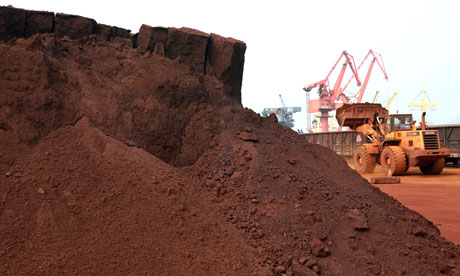Shortages of a handful of rare minerals could slow the future growth of the burgeoning renewable energy industries, and affect countries' chances of limiting greenhouse gas emissions, business leaders were told at the World Economic Forum in Davos this week.
Last year, prices of many scarce minerals exploded, rising as much as 10 times over 2010 levels before dropping back, said PricewaterhouseCoopers (PwC).
Terbium, yttrium, dysprosium, europium and neodymium are widely used in the manufacture of wind turbines, solar panels, electric car batteries and energy-efficient lightbulbs. But because these "rare earths" are mined almost exclusively in China, it is becoming increasingly difficult and expensive to source them in the required quantities.
In a survey of some of the largest clean energy manufacturers, 78% told PwC said they were already experiencing instability of supply of rare metals, and most said they did not expect shortages to ease for at least five years. Currently, 95% of the rare earth minerals needed by clean tech industries come from China which has set strict export quotas. Last year China reserved most for its own for its domestic wind, solar and battery industries, shifting costs to the US and Europe which do not mine any of the minerals.
Scarcity of the mineral resources could affect disrupt entire supply chains and countries' attempts to meet emissions targets, said PwC. "The energy sector could face very great problems if the world turns to [renewables] in a big way. In the short term, there will be major supply problems. The availability of these metals will define the growth of these industry sectors. There are so far not many alternatives," said Rob Mathlener, author of a report that urged companies to build future strategies around recycling and reusing resources.
Last December, Janez Potočnik, the EU commissioner for the environment, warned that the waste of valuable natural resources threatens to produce a fresh economic crisis.
None of the minerals is likely to physically run out, but it can take 10 years for countries to open new mines. In the US there has been growing concerns that China dominates the supply of the materials considered crucial for the expansion of the US defence, computer and renewable energy sectors.
A series of US government reports have urged an immediate increase in production of rare minerals. By mid-2012, US mining company Molycorp Minerals aims to produce 20,000 tonnes a year of nine of the 17 rare minerals, or about 25% of current western imports from China.
Malcolm Preston, PwC's global sustainability leader, said: "It's a time bomb. Many businesses now recognise that we are living beyond the planet's means. If these industries, supply chains and economies are disrupted by shortages in supply, then the 'luxury of choice' lifestyle many in the Western world have become accustomed to, will also be affected."
Six other core manufacturing industries, including aerospace, automotive and chemicals, were all found to be experiencing shortages. According to the US Congress report published last September, world demand for rare elements is estimated at 136,000 tonnes per year, with global production around 133,600 tonnes in 2010. It is projected to rise to at least 185,000 tonnes a year by 2015.

